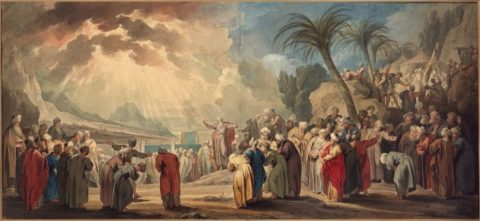Va’Etchanan – Deut. 3:23-7:11 (July 31/Aug. 1)

As the Torah Turns
Rabbi Lader’s Weekly D’var Torah
Va’Etchanan – Deut. 3:23-7:11 (July 31/Aug. 1)
Our Torah portion this week is Va’Etchanan – Deut. 3:23-7:11. Some years ago I got to study with Alex Israel, and I wanted to share his comments on this Torah portion with you: People have been known to criticize Judaism for being too legal, too “letter of the law” and not enough ethics, values and “spirit of the law”. In this regard, Nachmanides (Ramban) makes a monumental remark on this week’s Torah portion. He is commenting on the following verse:
“Be sure to keep the commandments, decrees, and laws that the Lord your God has enjoined upon you. Do what is right and good in the sight of the Lord” (Deut. 6:17-18)
This verse begs the question. Once one is doing the “commandments, decrees, and laws” of God, why add that one should “do what is right and good”? What additional observance could be indicated here? Thirteenth century Spanish Torah scholar Nachmanides (known as Ramban) answers:
From the beginning God said to keep God’s commandments, decrees, and laws as God has commanded them. And now, it says: even regarding what God did not command, pay attention to do what is good and right in God’s eyes, because God loves goodness and righteousness. … it is impossible for the Torah to list every detail of human conduct; interaction with neighbors and friends, the totality of business dealings, and societal and national laws. The Torah having legislated specific laws, such as: “Do not gossip” (Lev. 19:16); “Do not take vengeance or bear a grudge” (Lev. 19:18); “Do not stand idly by the blood of your neighbor” (Lev. 19:16); “Do not insult the deaf” ( Lev. 19:14); “Rise before the aged” (Lev. 19:32), etc., now makes a general statement which applies to the entire gamut of human behavior, the Torah repeats this idea that one should do what is “right and good” … acting beyond the strict demands of the law.”

Ramban is saying that the Torah leaves some of the ethics to our personal intuition and conscience. After legislating specific laws, like the Ten Commandments which are in this Torah portion, it understands that there are legal and ethical loopholes. In any situation, if a person thinks that something feels wrong, even if the law allows it, the Torah says: “Do what is right and good” — act ethically and listen to your conscience!
Have you ever had a feeling that something is just wrong, immoral even, and decided not to do it, not because of the law, but because of an inner feeling?
Ramban invests our moral intuition with seriousness and power; these are our conscience, our guilt-feelings. Our ethical instincts are a divine voice within ourselves.
From Previous Weeks

How… Alas… Where are you? Deut. 1:1-3:22 (July24/25)
As Moses begins his grand oration… he recalls that he could not lead them without help.

Mattot/Mase’ei – Num. 30:2-32:42/33:1-36:13 (July 17/18)
Moses recalls the wanderings — and all the stops along the way over the past forty years

Chukkat/Balak – Num.19:1-22:1/22:2-25:9 (July 3/4)
How do Torah portions get their names? Jewish tradition names our Torah portions from the first distinctive word in the…

Shelach Lecha – Num. 13:1-15:41
Our Torah portion this week is Shelach Lecha – Num. 13:1-15:41. Moses sends a group of leaders – one from…

